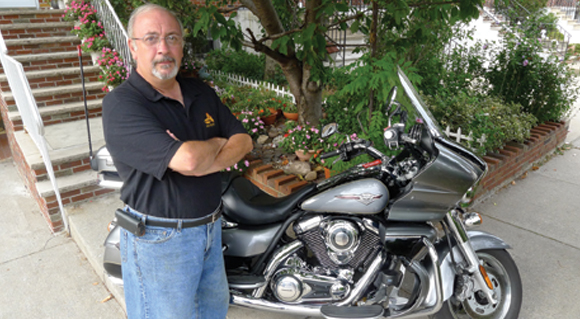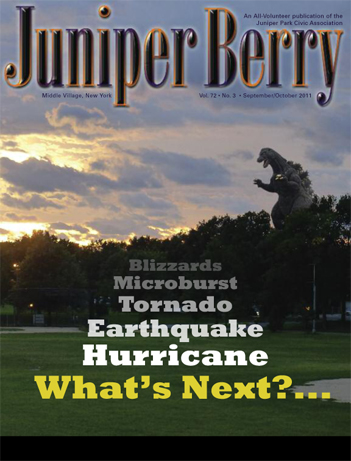On 9/11, Frank was a Captain in the Support Services Division of the New York City Department of Correction. He retired from the Correction Department after working there for 20 years, and is currently a teacher at Christ the King Regional High School, where he has been employed for five years. He is 54 years old, married with 2 children, and has lived in Middle Village his entire life. He attended Saint Margaret’s, then Aviation High School, and later John Jay College. He is an avid motorcyclist and enjoys camping. This interview was conducted in his home.
You just returned from the America’s 9/11 Ride.
How was it?
It was probably one of the more moving experiences that I’ve ever lived through. It was four grueling days of motorcycle riding. First day we rode 320 miles, the second day was almost 300 miles, third day almost 300 miles. We all met in Shanksville, Pennsylvania, and we toured the sight where Flight 93 went down, and from that sight we rode through many rural towns in Pennsylvania, then into Maryland, through parts of Virginia. In every town you went through there were firefighters out in full uniform, and thousands of people on the street holding little American Flags. They also held little signs reading, “We Won’t Forget.” There were also little kids waving flags and senior citizen veterans with their veteran hats on saluting us as we rode past, it was very, very emotional.
How many riders participated?
There were about 2500 riders on 1800 motorcycles.
What was the purpose of the America’s 9/11 Ride?
To remember those who lost their lives on 9/11 and after.
Now I would like to hear your story. What did you experience September 11th and after?
I was the Administration Captain for the Support Services Division, NYC Department of Corrections stationed at Riker’s Island. During our weekly planning meeting, the first plane hit the first World Trade Center Tower. Watching the news on TV, we were all trying to make sense of the situation. At first I thought it was a freak accident by some pilot, but after we heard the news of the second plane hitting the Pentagon, and the other Tower being hit, it became all too evident that our nation was under attack. We stood by, as ordered, to protect the facilities against inmates who might take advantage of the situation.
The next morning, September 12th, we were told that we were needed at Ground Zero. My division, the Support Services Division, ran Potter’s Field at Hart Island for the City of New York, so we had some experience in burying the dead. The Commanding Officer directed me to offer my assistance to the New York City Morgue, and with a detail of officers we were sent to Ground Zero.
The trip to Ground Zero was like traveling in outer space. Streets that were usually flooded with cars were now empty and abandoned. Upon exiting our van a block away, we could smell the awful, acrid smell of smoke. The first thing I remember was looking at the Deutsche Bank building with giant pieces from the World Trade Center pierced into it.
We arrived at Ground Zero at seven in the morning. It was surreal. The first thing that hit you was the mountain of ruin and countless volunteers passing buckets of hand-dug debris from one to the next. We were there for no more than 10 minutes when the Police Department’s commanding officer who was down there said there was an ambulance coming in “with a uniform,” and everything stopped, everybody in uniform lined the streets and saluted that vehicle. Unfortunately, we did this time after time.
After an hour or so at the site we became aware that we were involved with a recovery effort not a rescue. We were not there to rescue living beings. Ambulances began the unending ritual of delivering body bags full of remains. Those which could not be processed were marked and transferred to refrigerated trailers rented by the city. I assisted in the transfer of remains from the ambulances to the trailers. I cannot describe or discuss what we recovered in “the pit” as we sifted through the rubble. My only hope was that it would help to bring closure to those families who lost loved ones.
Did you lose any friends or family on 9/11?
Lost several friends, one childhood friend in particular, Kevin Pfeiffer, who was a firefighter. We used to hang out all the time. His brother was one of the first firefighters there at the Trade Center. He was with a French film crew down the block, and they actually saw it hit, and I think Joe was the first to call it in on the radio. And the daughter of another dear friend, Joe Mauer. His daughter, Jill Campbell Mauer was killed there just a few months after her little boy, Jake, was born.
Is there one heroic act that you saw by someone that day that stands out in your mind?
No. Everything that was being done that day was being done heroically. I can remember many acts of kindness that day. There were so many other little acts of kindness, I remember numerous times working in the morgue, when a van would pull up, the back doors of the van would open, and 25 pizza pies would come out and the guy would say thanks for doing a great job and leave. And that was it. No questions asked. There were so many acts of kindness like that on that day.
What are your thoughts as we approach the 10 year anniversary?
That we as a nation never forget. That we as a people support the folks who survived, and the folks who were first responders, never forget that we as a nation came together, and we need to keep coming together.
Is there anything you would have done differently that day?
I don’t believe so. You did everything you possibly could and unfortunately you couldn’t do a whole lot, all you could do was be there and pick up the pieces as you went.
Has your health been affected by your actions on 9/11? Do you have the health issues of all those who volunteered and responded that day?
Thankfully my health has not been affected but I do go for the blood work every year.
If today you had the ability to talk to those you were close to who lost their lives on 9/11, what would you say to them?
I would say to them that we’ll never forget you and the sacrifice you made that day.
Do you think the mosque should be built near ground zero?
Absolutely not.
What was your reaction when you first heard Osama bin Laden had been killed?
Tears of joy.
What do you think we have learned from 9/11?
To always be vigilant. Expect the unexpected.
Do you think we still have that sense of unity, togetherness, unselfishness, volunteerism, whatever you want to call it, today that we had then in response to the attacks?
Having just traveled a thousand miles on that ride, absolutely, it’s there.
What do you plan to do this September 11th?
You know what I’ll be doing? I’m one of the members of the 9/11 Candle Light Vigil Committee of Juniper Valley Park so I will be at the Vigil. We will be setting-up a memorial garden in the park with a beautiful plaque in it. We’re planning a two-hour candle light vigil with music, prayer, videos, and speeches, all with the resounding words to our community to “never forget.”
What can our readers do if they are interested in getting more involved?
We asked Middle Village and the neighboring communities to chip in and support our effort with regard to the memorial garden and they rose to the occasion beautifully. So, I would say that if there is anything people would like to do at this point to remember 9/11, consider the Fire Department and Police Department’s Widow’s Fund, the Salvation Army, things like that.
However, we are going to be maintaining that garden forever to keep it beautiful, so if anyone would like to contribute they can log on to our website which is 9-11vigil.org. You can volunteer or donate on the website, or send a check to P.O. Box 75, Middle Village, NY 11379.
Frank, one of the reasons we have such a great country is because of unselfish and brave people like you. Thank you for spending a few minutes with me.



